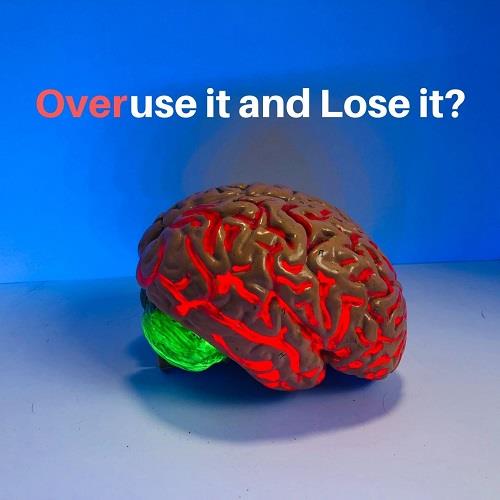A lot of the discussion around brain health focuses on stimulating brain activity and challenging yourself in varied ways to keep all your neurons firing regularly enough to keep them sharp. With neurons, we know it’s a “use it or lose it” situation.
Some new research now shows that too much brain activity can potentially have a negative effect on longevity. So, it’s also a “use it too much and lose it” situation.
“Oh crap,” you may be thinking, “just when I think I start to figure out how to keep my brain healthy, everything changes!” Well, I hope you aren’t thinking that…but many people do get frustrated with conflicting health info and give up.
Here are the big takeaways if you’re in a hurry, then I’ll help make a little more sense of it.
- Brains were examined of people who had died in their 60’s up to people over 100. People who died before their mid-80’s had lower levels of a brain protein that decreases neural activity.
- This inspired research where the brains of living worms and mice were manipulated to increase neural activity.
- Excessive brain activity appears to inhibit that protein. (And this protein has been shown to be protective against Alzheimer’s disease.)
This is very preliminary research, but given what we do know about how our brain’s work and what causes brain disease, here’s what I think:
- Our brains use a lot of energy so excessive brain activity will accordingly generate a high concentration of the waste products of energy production.
- The build-up of waste products from energy production are cleared out by spending time getting proper sleep and in a relaxed waking state.
- Compromised sleep or a mind that is always buzzing with the stresses and demands of our lives can easily lead to an environment in the brain which promotes more damage to our brain tissues, which, since we don’t have nerve endings in our brain’s, we cannot feel the inflammation like we do with a sprained ankle, for example.
Most Importantly: What can you do with this information?
- Make your up time more “up” and your downtime more “down.”
- Get proper sleep.
- Engage in wakeful yet calming activities like meditation (without your smartphone!) or simply spending time sitting in nature or walking in nature (without your smartphone!) or even cooking or any activity that you find “meditative.”
One of my core beliefs is that if you make your up time more “up,” your down time with be more “down.”
This means that when we are supposed to be up, we are fully up and engaged. This is why, for example, the Funtensity approach to fitness involves integrating brain challenges, fun, and play into the physical challenge. When you have a truly powerful, positive experience, when you come down from it your downtime is more restorative and is actual quality rest time.
This is in sharp contrast to the slightly manic “always on” mental state that is the result of letting our modern way of life dominate your thoughts and your day.
Think back to a time you were physically challenged yet having fun and connecting with others doing something you love. When it was over, you probably felt a different kind of calmness come over you, even before it is time for sleep.
When you do something mentally and physically awesome, you get a peacefulness afterward that is hard to replicate any other way. This high-quality downtime calms neural activity (i.e., your brain stops buzzing) which is just good for mental health.
However, if the premise of this research holds for the future, it will also mean that high quality downtime is also good for the physical health of your brain. And a clear pathway to high quality downtime is high quality up time.
Don’t just follow…Follow, think, and move! Find Funtensity on Facebook, Instagram, or Twitter social media platforms.
Study Details: Zullo, J., et al. “Regulation of lifespan by neural excitation and REST” Nature volume 574, pages 359–364 (2019)
Photo by Natasha Connell on Unsplash

